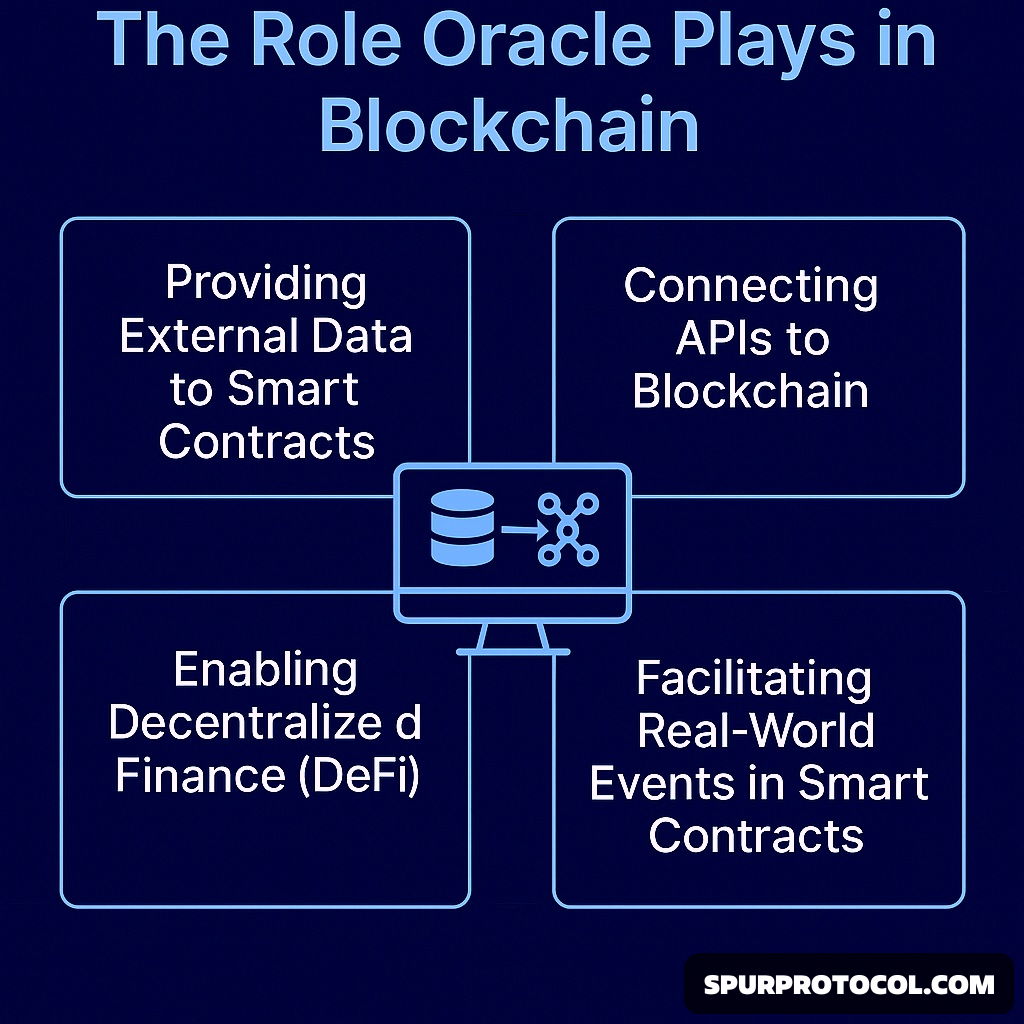The Role Oracle Plays In Blockchain
Blockchain is like a closed, digital world — a highly secure and decentralized system where data is stored transparently, but only what happens inside the blockchain is known to it.
But here’s the big question:
"What if the blockchain needs information from the real world — like weather conditions, stock prices, football scores, or even currency exchange rates?"
This is where oracles come in.
Go Back

🕒 9:11 AM
📅 Apr 05, 2025
✍️ By BillionaireHighPriest
What is a Blockchain Oracle?
A blockchain oracle is like a bridge or messenger that connects the real world (outside data) with the blockchain world (inside data).
In simple words:
Oracle = Real-World Data Supplier for Blockchain.
Without oracles, blockchains would be like a phone without an internet connection — powerful but limited.
Why Can’t Blockchain Access Real-World Data Directly?
Blockchains are designed to be trustless, meaning no one single entity controls it. Allowing them to directly access the internet would break this rule because the internet isn’t trustless — it's full of centralized data sources.
Blockchains need accurate, verified, and tamper-proof data to function properly. This is why they rely on oracles.
Roles Oracle Plays in Blockchain
1. Providing External Data to Smart Contracts
Smart contracts are self-executing codes on the blockchain. But they can’t fetch real-world information on their own.
Example:
A smart contract for crop insurance needs weather data.
Oracle supplies the rainfall data from a trusted source.
If rainfall was below a certain level, smart contract automatically pays the farmer.
2. Connecting APIs to Blockchain
Oracles connect external APIs (Application Programming Interfaces) to blockchain networks.
Example:
Sports data API → Oracle → Blockchain betting platform
Now bets can be settled automatically based on real game scores.
3. Enabling Decentralized Finance (DeFi)
DeFi platforms depend heavily on oracles for:
- Crypto price feeds
- Exchange rates
- Lending and borrowing rates
Without accurate price data from oracles, DeFi systems wouldn’t work properly.
4. Facilitating Real-World Events in Smart Contracts
Example:
Flight Delay Insurance
Oracle checks flight status from airlines.
If the flight is delayed, smart contract automatically pays compensation.
5. Enabling Cross-Chain Communication
Some oracles help different blockchains talk to each other.
Example:
Oracle helps Bitcoin blockchain communicate with Ethereum blockchain for swapping assets.
Types of Oracles:
1. Software Oracle
Software Oracles fetch data from online sources like websites, APIs, and databases. They supply blockchains with information such as weather reports, stock market prices, and other online data that smart contracts might need.
2. Hardware Oracle
Hardware Oracles collect data from physical devices in the real world. These devices could include IoT sensors, barcode scanners, or any smart device capable of capturing real-world information and sending it to the blockchain.
3. Inbound Oracle
Inbound Oracles are responsible for bringing external data into the blockchain network. For example, they can import temperature data or any other real-world information needed by a smart contract to operate.
4. Outbound Oracle
Outbound Oracles send data from the blockchain to the external world. This allows actions in the physical world to be triggered based on smart contract decisions, such as triggering a bank payment when certain blockchain conditions are met.
5. Decentralized Oracle
Decentralized Oracles gather data from multiple sources to avoid relying on a single point of failure. This increases trust and reduces the chances of manipulation. Popular examples of decentralized oracles are Chainlink and Band Protocol.
Real-Life Example of a Popular Oracle
CHAINLINK
Chainlink is the most popular decentralized oracle network.
It collects data from multiple trusted sources.
It ensures accuracy using smart methods like multiple validators and cryptographic proofs.
Why Are Oracles So Important?
Without oracles:
- Smart contracts would be blind.
- Blockchains would stay isolated.
- Real-world adoption would be limited.
With oracles:
- Blockchain apps can interact with real-world events.
- Automation becomes possible.
- DeFi, insurance, gaming, logistics, and many industries benefit.
If Blockchain is like a highly secure castle with no windows, then Oracle is like a trusted messenger that brings news from the outside world into the castle - without compromising its security.
Oracles play a critical role in expanding blockchain use cases beyond cryptocurrencies. They connect smart contracts with real-world data, enabling automation, trust, and real-life applications across industries.
